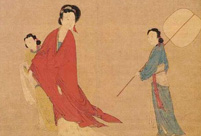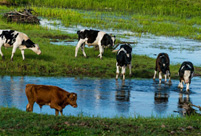

BEIJING, Aug. 3 (Xinhua) -- A claim by a Chinese scientist to have invented new gene-editing technology has come under fire from fellow scientists unable to reproduce his results.
Hebei University of Science and Technology in north China, where Han Chunyu, 42, is an associate professor, told Xinhua on Monday that Han will "publicly verify" his findings under the supervision of an "authoritative third party" in around a month.
Han published a paper in the May edition of "Nature Biotechnology" describing new genome editing technology NgAgo that could be an alternative to the mainstream CRISPR/Cas9 technique.
With China currently in desperate pursuit of heavyweight scientific achievements, Han became an overnight sensation. Beyond the "discovery" itself, he was widely praised for successfully pursuing such ground-breaking research at a university with very little standing in the filed of genetic sciences.
Doubts immediately emerged with other researchers declaring that the results cannot be replicated, among them Dr. Gaetan Burgio of the Australian National University.
On Friday, Burgio said in an online article that his laboratory had tried to establish Han's protocol over the last two months, but found "no evidence for genome editing with NgAgo after multiple attempts with various settings and three different genes."
Burgio went on to call for researchers to be more open with their results, rather than to "chase high impact publication and be secretive."
On Tuesday, "Nature Biotechnology" announced that several researchers had contacted the journal with similar doubts and the issue is now under investigation through a well-established procedure.
As a condition of publication in any Nature Research journal, authors are required to make all material, data, code, and associated protocols promptly available to readers.
Han, in the other hand, said scientific achievements should be subject to the tests of time and practice, adding that he is confident his results will be reproduced by other researchers.
In earlier media interviews, he claimed the experiment had been repeated many times in his laboratory. Some Chinese biologists, who declined to be named, have come to Han's lukewarm defense, suggesting new techniques sometimes need modifications and is not unusual for doubts to be expressed.
Han said that the skeptics had gone to far. He has been bombarded every day by email and phone calls, some late at night, accusing him of faking his results.
 Spectacular bridge with one of the tallest piers in the world
Spectacular bridge with one of the tallest piers in the world Magnificent view of Hukou Waterfall
Magnificent view of Hukou Waterfall A glimpse of Stride 2016 Zhurihe B military drill
A glimpse of Stride 2016 Zhurihe B military drill US Navy chief tours Liaoning aircraft carrier
US Navy chief tours Liaoning aircraft carrier Chinese American woman wins Miss Michigan
Chinese American woman wins Miss Michigan Centenarian couple takes first wedding photos
Centenarian couple takes first wedding photos Traditional Tibetan costumes presented during fashion show
Traditional Tibetan costumes presented during fashion show How did ancient people escape the summer heat
How did ancient people escape the summer heat Breathtaking scenery of Hulun Buir grassland
Breathtaking scenery of Hulun Buir grassland Top 10 livable Chinese cities
Top 10 livable Chinese cities Top 20 hottest women in the world in 2014
Top 20 hottest women in the world in 2014 Top 10 hardest languages to learn
Top 10 hardest languages to learn China’s Top 10 Unique Bridges, Highways and Roads
China’s Top 10 Unique Bridges, Highways and Roads Copyright or copy, right?
Copyright or copy, right? Why have US tech giants sunk in China?
Why have US tech giants sunk in China? Despite tech breakthroughs, regulatory hurdles prevent business from taking off
Despite tech breakthroughs, regulatory hurdles prevent business from taking off Experts worry religious extremism is infiltrating major Chinese cities
Experts worry religious extremism is infiltrating major Chinese citiesDay|Week